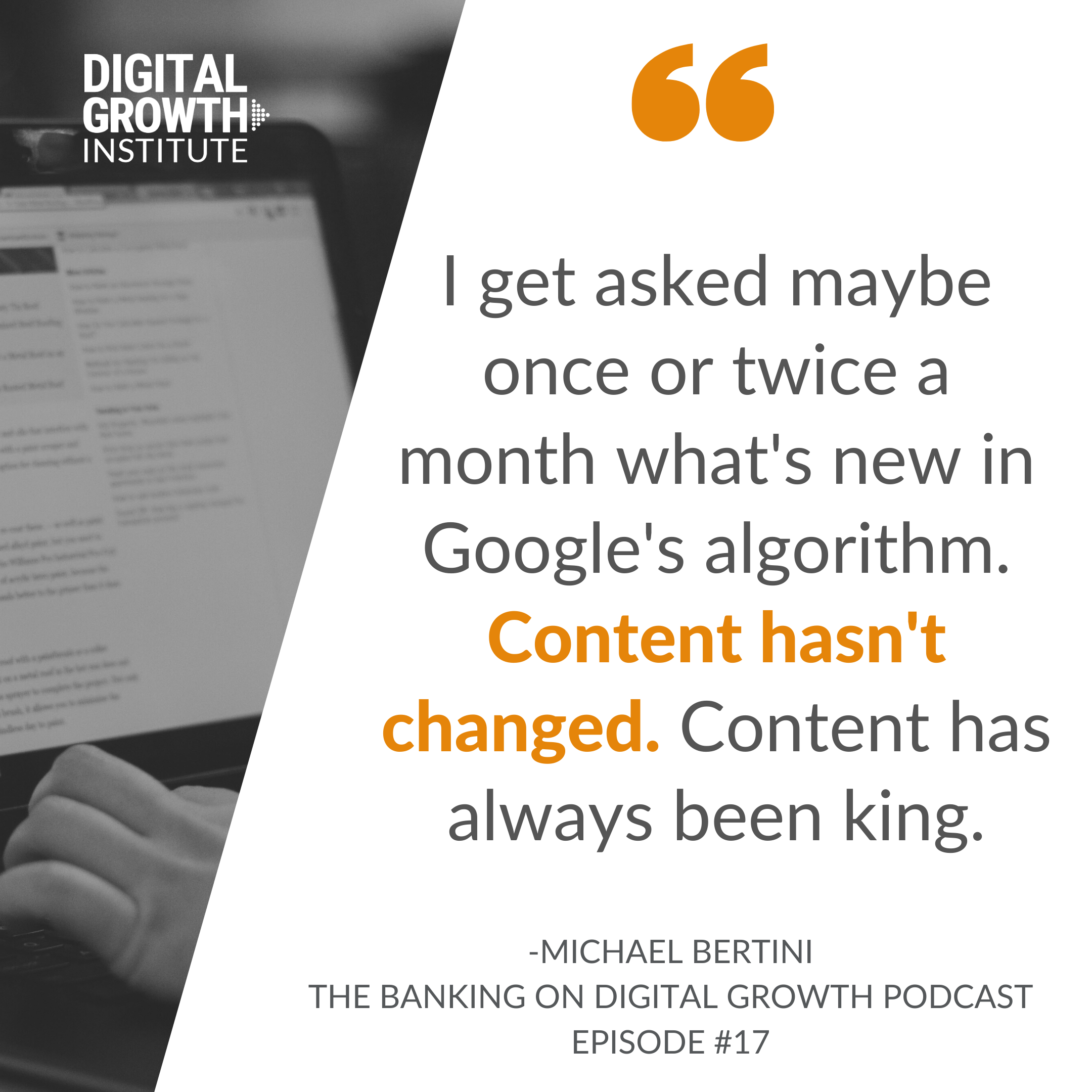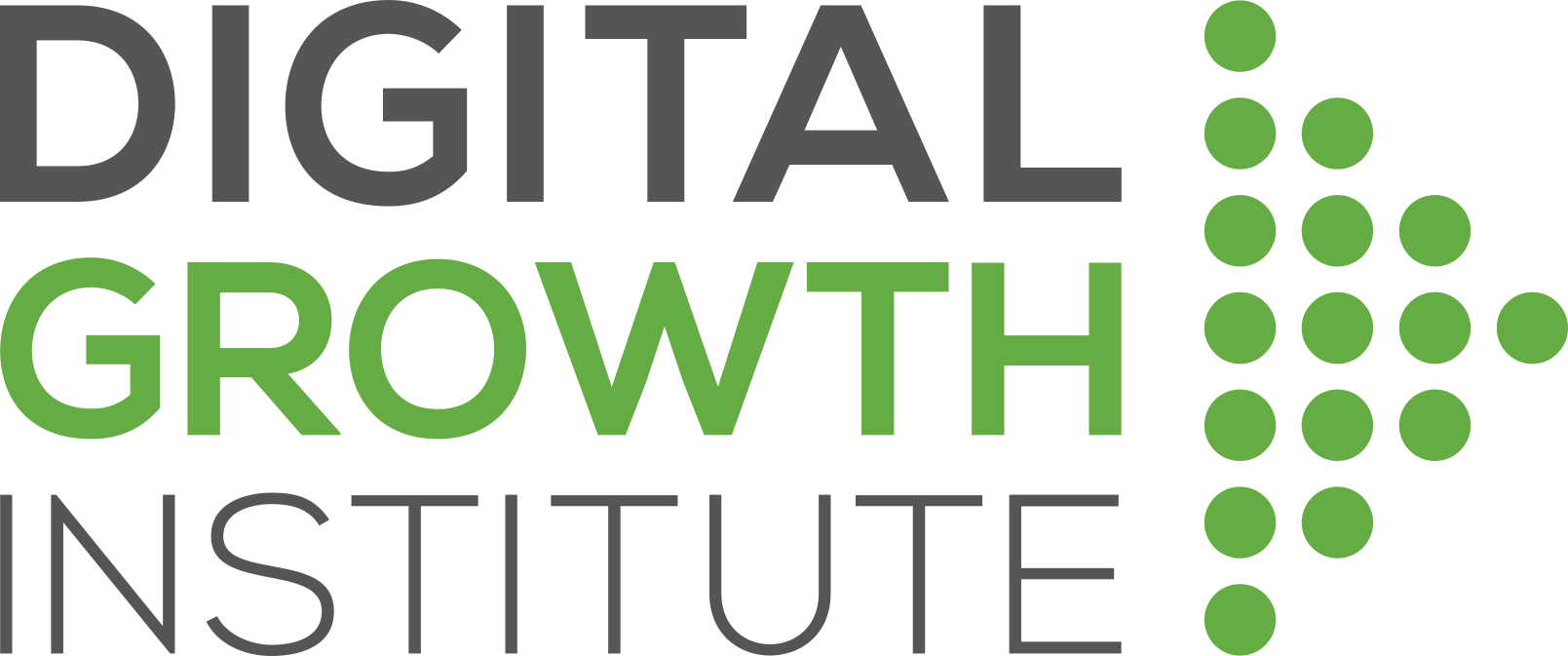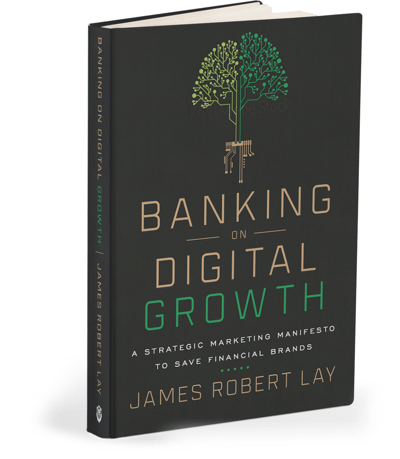
Michael Bertini, online marketing consultant search strategist at iQuanti, joined James Robert Lay on the Banking on Digital Growth Podcast to share insights on how to make your bank’s or credit union’s content marketing strategy even better. Content marketing continues to explode across all industries and brands are pushing out a massive amount of content, in rapid time.
The Fuel of the Digital Growth Engine
Content is the fuel of the digital growth engine. Whether it’s on the website pages, targeted digital ads and emails, in marketing automation workflows, or through sales and services enablement, content is the fuel that turns these gears.
Content is what banks and credit unions can use to communicate hope and help during the financial crisis people are facing in the communities they serve.
Yes, many banks and credit unions are already producing content.
But, you may want to rethink your content strategy.
That’s because people are looking for an escape. The environmental changes are taking a toll on mental health, and there are more and more publications requesting brands share anything but pandemic related content. “Marketers need to take this time right now to get as much content in front of people as possible, letting them know that things are okay, and there's other things to talk about other than just what's going on right now.”
“It can't be all doom and gloom,” James Robert reminds us. Remove the news images of the virus that is plastered across the website. “Those nuances subconsciously spark and communicate fear.”
Instead, Michael recommends giving users a “mental out”, or an opportunity. Think about the days before tablets and smartphones. What did people do to escape? Read a book. No news feeds. No alerts. Nothing to take them back to reality. So what can banks and credit unions do? Something we’ve mentioned before on a recent podcast with Seth Siegal-Garnder, is the idea of building micro-communities. Maybe a Facebook live event or a Netflix Party. Organize digital cash mobs to promote a local business. Even consider hosting Airbnb experiences for your account holders. Give them a break. Provide them with a branded escape.
We’re humans. We thrive to come together as people. As a community.
In this time of isolation, build a digital community.
5 Ways to Double-Down on Content
One of the things that we're seeing is the need to move quickly, the need to adapt, and the need to evolve.
So many financial institutions are throwing away millions of dollars, especially in the ad game, because they can’t keep up with the rapid changes.
This pandemic is a perfect time to test an agile strategy. And when you think of the banks and credit unions credit unions that are doing really well, it's because they're agile.
They are listening, they're learning, and most importantly, they are applying what they have learned.
One of the questions Michael gets continuously asked is, "What's new in Google's algorithm?"
Everybody's always looking for the secret sauce and the golden goose, and the next best thing since sliced bread, content hasn't changed. Content has always been king, relevant content has always been king, quality content has always been king, and it just hasn't changed.

With Michael’s recommendations, here are five ways your bank or credit union can double-down on your content.
- Put together several content calendars. One content calendar for your on-page content like blogs and articles. Then a second calendar for supporting and promoting that content via email or social media.
- Create content that is evergreen: “Future-proof” and it will not go out of date. Think, for example, Home Buying Guide or Business Growth Guide. Maybe even consider writing a book.
- Reach out to your affiliates, build a partnership, and offer a digital content exchange. This creates off-page SEO, impacting your search engine results.
- One of our mantras at the Digital Growth Institute is “who before how.” Hire freelance writers to create content for you or find people who are already creating micro-influencer brands around personal finance that are looking to transfer their knowledge.
- Transform the marketing team to start thinking like a media organization, working to promote the content that was produced. It’s not about what you say about yourself, but what others are saying about you.
As we’ve moved out of the service economy and into the experience economy, James Robert predicts we will move into the knowledge or expert economy. This is where content can be played to position yourself as the expert within the communities the financial brand serves.
Stick to the Foundations
As financial brands continue to make progress along their digital growth journey, one of the things Michael recommends is sticking to the foundations.
“A lot of brands are all looking for these different angles if you will, to take, and these next golden gooses. They completely go off foundational stuff... I remember my wrestling coach telling me to learn these set of moves. Become the best at these moves and drill them over and over and over. Drill them so much that whenever something happens, it will automatically trigger.”
If brands really want to develop evergreen content strategies that generate and nurture leads --creating exponential value over an extended period of time--, there are two key areas everything else has to revolve around:
- A website that sells.
- The right content in the right place.
As we continue to navigate through the COVID-19 health crisis and into the financial crisis, a lot of people are going to be affected.
What’s something that won’t change?
Money.
Money has been stressful.
And money will continue to be stressful regardless of the environment that we're in. It is our job as financial brands to reduce the stress, to provide help and hope, and then to provide a clear path forward to a bigger, better brighter future.
Generate Revenue with Content
Now is the time to offer help and hope beyond the checking account.
Commit to the transformation of people over the transaction of dollars and cents
Always remember, people do not have a savings problem. People have spending problems. And these spending problems are rooted deep in behavioral programming tied strongly to a person’s environment and family of origin.
The good news is people don't have to remain stuck like this.
Coaching, guidance, and advise the next level of financial services b/c people can not change on their own. They need support. They need accountability. They need a community. They need you.
Financial health and wellbeing --wrapped up in coaching, guidance, and support-- is the greatest future revenue opportunities for banks and credit unions.
And all of this revenue generating coaching, guidance, and support begins with content.
This article was originally published on October 2, 2020. All content © 2024 by Digital Growth Institute and may not be reproduced by any means without permission.





